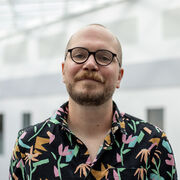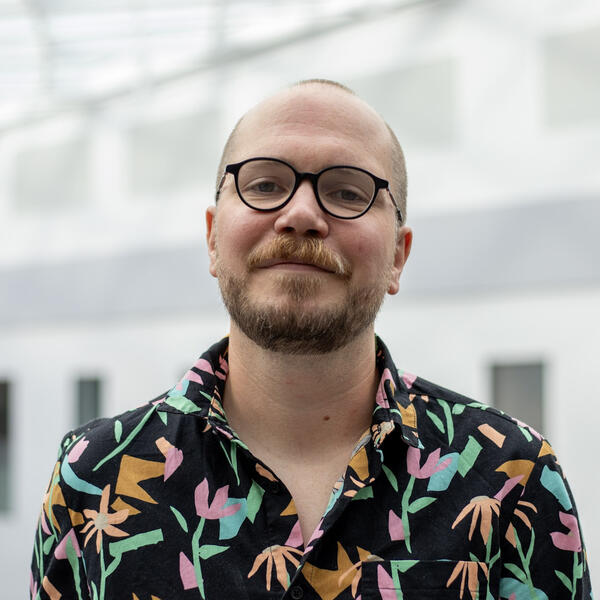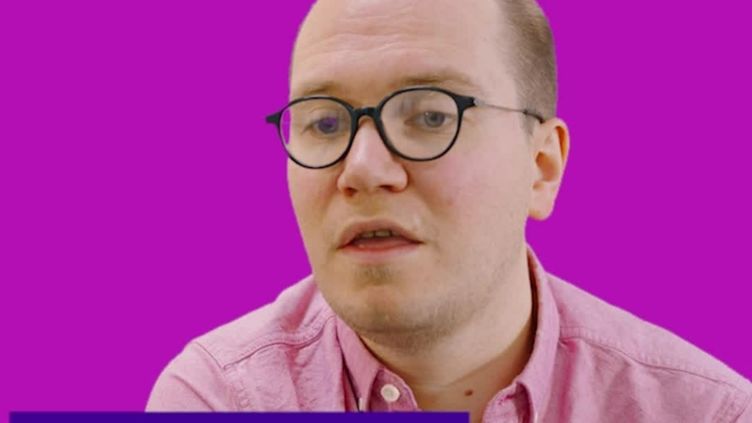Professor Mark Taylor
School of Education
Professor of Quantitative Social Sciences


+44 114 222 7124
Full contact details
School of Education
The Wave
2 Whitham Road
Sheffield
S10 2AH
- Profile
-
Mark is Senior Lecturer in Quantitative Methods. He’s interested in cultural and creative industries, with particular focuses on social inequalities in work and in participation. His background is in sociology, but his research interests are interdisciplinary, across sociology, cultural policy, cultural studies, music, games, and other fields.
His most recent book, with Orian Brook and Dave O’Brien, is Culture is bad for you: Inequality in the cultural and creative industries.
He's also the author of reports on the UK Games Industry Census from both 2020 and 2022, which he delivers in participation with Ukie. He delivered a talk on this work at the Game Developer Conference in 2022.
Alongside his role at the SMI, he also sits on the Department for Digital, Culture, Media and Sport's College of Experts.
Mark joined the SMI in 2014. Before that, he worked at the Universities of Manchester and York, and completed his DPhil in Sociology at the University of Oxford.
A longer list of publications can be found below, or on Google Scholar.
- Research interests
-
Mark's interested in inequalities in cultural and creative industries. Why is it that work in cultural jobs is so socially exclusive, given the way that the sector describes itself? Why is it that audiences are so socially homogeneous? How does the governance of the arts relate to inequalities?
He’s also interested in related issues, such as the ubiquity of data in everyday life, the conditions of working in creative jobs, the ways that what constitutes creative work are constructed and defined, and the overall structure of different industries.
Mark’s used a wide range of different research methods, including the collection of original survey data, analysis of existing large survey data sources, network analysis, spatial analysis, and qualitative methods. He's particularly keen on the creative use of data visualisation in research.
While most of his work is based in the UK, he's also currently working with a team at Deakin University on a project about audience diversification in the arts in Australia.
- Publications
-
Books
- Culture is bad for you: Inequality in the cultural and creative industries, revised and updated edition.


- Culture Is Bad for You Inequality in the Cultural and Creative Industries. Manchester University Press.


- Making Sense of Data in the Media. SAGE Publications Ltd.


Journal articles
- Precarity and second job-holding in the creative economy. Cultural Trends. View this article in WRRO


- Centring the audience: attitudes and behaviours in Australian arts organisations. International Journal of Cultural Policy. View this article in WRRO


- The parenthood penalty in creative occupations: how the Covid-19 pandemic made existing inequalities worse. Work and Occupations, 52(4), 615-649. View this article in WRRO


- Where are the working class in the British film industry? Data from the British Film Institute. Media, Culture & Society, 47(4), 785-804. View this article in WRRO


- Divergences and convergences across European musical preferences: how taste varies within and between countries. Poetics, 108. View this article in WRRO


- How people connect fairness and equity when they talk about data uses. Big Data and Society, 11(4). View this article in WRRO


- What ifs: the role of imagining in people's reflections on data uses. Convergence: The International Journal of Research into New Media Technologies, 30(6), 2025-2041. View this article in WRRO


- Challenging assumptions about the relationship between awareness of and attitudes to data uses amongst the UK public. The Information Society, 40(1), 32-53. View this article in WRRO


- Collecting and classifying data on audience identity: the cultural background of festival audiences. Cultural Trends, 33(5), 469-486. View this article in WRRO


- Social mobility and ‘openness’ in creative occupations since the 1970s. Sociology, 57(4), 789-810. View this article in WRRO


- Cultural governance within and across cities and regions: evidence from the English publicly funded arts sector. European Urban and Regional Studies, 30(2), 186-204. View this article in WRRO


- Social class in UK museums: Mark Taylor interviews Michelle McGrath. Journal of Museum Education, 47(4), 414-427.


- Cultural consumption and Covid-19: evidence from the Taking Part and COVID-19 Cultural Participation Monitor surveys. Leisure Studies, 42(1), 38-55. View this article in WRRO


- Who runs the arts in England? A social network analysis of arts boards. Poetics, 92(A). View this article in WRRO


- Inequality talk : how discourses by senior men reinforce exclusions from creative occupations. European Journal of Cultural Studies, 24(2), 498-513.


- “There’s no way that you get paid to do the arts”: unpaid labour across the cultural and creative life course. Sociological Research Online, 25(4), 571-588. View this article in WRRO


- The values of culture? Social closure in the political identities, policy preferences, and social attitudes of cultural and creative workers. The Sociological Review, 68(1), 33-54.


- The coming crisis of cultural engagement? Measurement, methods, and the nuances of niche activities. Cultural Trends, 28(2-3), 198-219.


- Who watches the watchmen? Evaluating evaluations of El Sistema. British Journal of Music Education, 35(3), 255-269. View this article in WRRO


- Cultural Engagement and the Economic Performance of the Cultural and Creative Industries: An Occupational Critique. Sociology, 53(2), 347-367.


- Subjective well-being in cultural advocacy: a politics of research between the market and the academy. Journal of Cultural Economy, 11(3), 225-243.


- ‘Culture is a meritocracy’: why creative workers’ attitudes may reinforce social inequality. Sociological Research Online, 22(4). View this article in WRRO


- Bowling even more alone: trends towards individual participation in sport
. European Sport Management Quarterly, 17(3), 290-311. View this article in WRRO


- Taking Part: the next five years (2016) by the Department for Culture, Media and Sport. Cultural Trends, 25(4), 291-294. View this article in WRRO


- Nonparticipation or different styles of participation? Alternative interpretations from Taking Part. Cultural Trends, 25(3), 169-181. View this article in WRRO


- On Social Class, Anno 2014. Sociology, 49(6), 1011-1030.


- The Hidden Dimensions of the Musical Field and the Potential of the New Social Data. Sociological Research Online, 18(2), 11-21.


- A New Model of Social Class? Findings from the BBC’s Great British Class Survey Experiment. Sociology, 47(2), 219-250.


Book chapters
- What happened to the workers? Understanding the impact of the pandemic on jobs and working hours in the cultural sector, Pandemic Culture the Impacts of Covid 19 on the Uk Cultural Sector and Implications for the Future (pp. 54-94).


- The Coming Crisis of Cultural Engagement? Measurement, Methods, and the Nuances of Niche Activities, A Reader on Audience Development and Cultural Policy (pp. 212-234). Routledge


- Collecting and Classifying Data on Audience Identity: The Cultural Background of Festival Audiences, A Reader on Audience Development and Cultural Policy (pp. 194-211). Routledge


- How Do We Explain Inequality Within Artistic and Cultural Occupations? The Problem of Downward Social Mobility, Sociology of the Arts (pp. 37-55). Springer Nature Switzerland


- Creative Higher Education: insights from UCAS and Census 2021 In Comunian R, Dent T, O'Brien D, Read T & Wreyford N (Ed.), Making The Creative Majority Kings College London (KCL) View this article in WRRO


- The coming crisis of cultural engagement? Measurement, methods, and the nuances of niche activities, Audience Data and Research (pp. 118-139). Routledge


- Art Workers, Inequality, and the Labour Market: Values, Norms, and Alienation Across Three Generations of Artists, Sociology of the Arts (pp. 75-96). Springer International Publishing


- Connecting epistemologies and the early career researcher, Research Impact and the Early Career Researcher (pp. 106-126). Routledge


- The creative economy, the creative class and cultural intermediation, Cultural Intermediaries Connecting Communities Revisiting Approaches to Cultural Engagement (pp. 27-42).


Reports
- Arts, Culture and Heritage: recent trends in UK workforce and engagement in England View this article in WRRO


- Higher Education and the Arts and Culture Sectors View this article in WRRO


- Changing organisations to diversify arts audiences: summary of findings from the community of practice: Phase two report View this article in WRRO


- Audiences and workforces in arts, culture and heritage View this article in WRRO


- Public perceptions of BBC data uses in experiments which give people more control of data


- The BFI film fund and class: Breaking down the data View this article in WRRO


- Changing audiences to diversify arts audiences: summary of findings from national survey View this article in WRRO


- Public perceptions of DWP’s uses of data for identity verification


- Public perceptions of sharing and aggregating health data


- Report on Living With Data Interviews & Focus
Groups


- UK Games Industry Census 2022: Understanding diversity in the
UK games industry workforce View this article in WRRO


- Living with Data survey report


- Public understanding and perceptions of data practices: a review of existing research


- UK Games Industry Census 2020 View this article in WRRO


- Panic! Social class, taste and inequalities in the creaitve industries View this article in WRRO


Working papers
- Cultural Consumption and Covid-19: Evidence from the Taking Part and COVID-19 Cultural Participation Monitor surveys.


Datasets
- Makerspaces in the Early Years: Current Perceptions and Practices of Early Years Practitioners, Library and Museum Educators and Makerspace Staff - A Survey.


- UK (Sheffield) (Makerspaces in the Early Years).


Preprints
- Inequality talk: How discourses by senior men reinforce exclusions from creative occupations, Center for Open Science.


- There was no golden age: social mobility into cultural and creative occupations, California Digital Library (CDL).


- ‘There's no way that you get paid to do the arts’. Unpaid labour across the cultural and creative life course, Center for Open Science.


- Culture is bad for you: Inequality in the cultural and creative industries, revised and updated edition.
- Teaching interests
-
Mark’s teaching is focused on working with students so that they can articulate the questions they’re interested in answering, identifying the methods that are most suitable for answering those questions, and implementing those methods practically. He’s particularly interested in working with students who don’t have a background in quantitative methods or in programming who are interested in becoming more comfortable with working with data.
While working at the SMI, Mark’s taught a wide range of modules, including data visualisation, research design, and social analytics. He’s also the author, with Andy Bell, Todd Hartman, Aneta Piekut, and Alasdair Rae, of Making sense of data in the media.
He’s been a Fellow of the Higher Education Academy since 2016, and a Senior Fellow since 2018.
Mark's currently serving as the SMI's Director of Education.
- PhD Supervision

